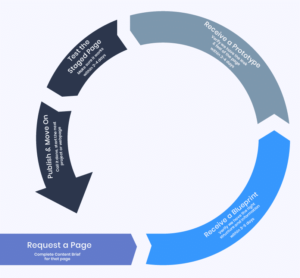What is an SSL Certificate, and why does my website need one?
Encrypting traffic between a customer's browser and your server protects you both. And boosts SEO.
Every small business wants a secure website. No matter what information you exchange between you and your customer, it needs to be protected. Customers and vendors should be able to trust that your site is safe to work with.
There are plenty of risks to consider when it comes to securing your website. Protect against some of them by having a valid SSL Certificate.
What is an SSL Certificate?
SSL stands for Secure Sockets Layer, and it provides an encrypted link between a server and a web browser. The visitor requests a link to a website, the website server provides a secure SSL certificate with a one-time use encryption key to encrypt the data the user sends back. The server decrypts the information and secures the session.
In plain english, it’s a way to establish a secure, coded way to send information between a website and a visitor. It encrypts the data so only people with the right certificate can access it.
When is an SSL Certificate used?
They’re most commonly used on pages where visitors need to put in sensitive information.
Credit Card Forms
When you buy something online, you expect your payment information to be secure. An SSL certificate ensures that credit card information stays between a web form and a user. The last thing anyone wants is a 3rd party to creep on their financial information.
Password Logins
It makes sense, but you always want passwords login forms to be secure. If a hacker can masquerade on your site as a valid user, they can compromise all that user’s data and get access to sections of your site they should not get access to.
Also, (as we talk about in our Ultimate Guide To Securing Your Business Website,) people tend to re-use the same password across multiple services and platforms. While that isn’t particularly smart, it means that if a hacker can get access to one valid username/password combination, they may get access to even more of that user’s sensitive information.
Sensitive Information
Any time you expect a user to fill out personal information, that page should be secured with an SSL certificate. Whether it’s contact information, social security numbers, legal or medical records, or even a date of birth- all of these are sensitive pieces of information that a visitor is entrusting you with, so be sure to keep them safe and sound.
Does My Site Really Need One?
Well, let’s put it this way: yes.
Seriously, if you’re accepting any sort of customer information whatsoever, you need to make sure that it’s secured. If you don’t, you’re betraying the trust of your customers who expect that you’re protecting their sensitive info. So from the perspective of building trust in your company and brand, make sure that you’re using SSL Certificates.
Even if you don’t take any customer info at all on your site, you won’t be able to get away without SSL certificates. Starting in 2017, Google began flagging all non-secure websites. If you use chrome, check out the top left corner of your navigation bar. See where it says “Secure” in happy green letters? That will also inform your customers if your site is not secure. In less happy green terms. So keep your customers happy and keep their info safe!
Need some SSL love for your site? SuperWebPros makes sure that all of our clients’ sites are secured, and that includes SSL certificates. Check our our web maintenance plans that start at just $99/mo!








